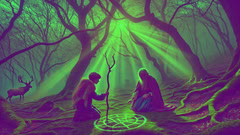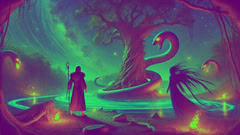Introduction
Beneath the endless sweep of the Great Hungarian Plain, where wind bends the grass into a living sea and wildflowers paint the fields with the palette of the dawn, a legend has echoed for centuries. The plains hold many secrets—stories written in the movements of clouds, in the hush of summer storms, in the soft loam beneath the hooves of horses. Yet none is as enduring or as beloved as the tale of Prince Csaba, the youngest son of Attila the Hun. Born during an era when the world was shaped by swords and destinies were carved by courage, Csaba’s life was a bridge between myth and memory. His story is carried on the lips of grandmothers and sung in fireside ballads; it lingers in the hearts of a people who, even today, look up on clear nights and search the sky for his promise. For legend says that in Hungary’s darkest hour, when hope is almost lost, Csaba will return, galloping down the star-silvered road of the Milky Way with his warrior band, bringing salvation to his homeland. But before prophecy, there was a boy—a prince who loved the wide world, who learned early that the earth listens, and who dreamed of peace while the nations around him clamored for war. This is his story: of loss and longing, valor and vision, and the unbreakable thread that binds a people to their land and to each other. Through forests haunted by memories and mountains crowned with mist, through the rise and fall of kingdoms, Csaba’s name endures—a beacon, a hope, a legend that refuses to fade beneath the weight of time.
The Last Days of Attila’s Court
Attila the Hun’s camp was a city of tents and flickering fires. At its heart stood the grandest tent of all—a pavilion stitched from horsehide and decorated with intricate patterns, guarded by warriors whose eyes never slept. Here, Attila’s sons played at sword-fighting by day and listened to elders recite the glories of their ancestors by night. Among them, Csaba was the youngest and perhaps the most restless. His hair was the color of chestnuts and his eyes shone with questions: Why do men fight? Must peace always be shattered by ambition?

The court was a place of feasting and decision, but it was also a place where shadows gathered. Attila, the Scourge of God, was aging. Gray threaded his mane, and his laughter, once fierce and free, grew rare. He watched his sons—Ellac, Dengizich, Ernakh, and Csaba—with pride and worry. He saw in them both the promise and peril of what he had built. The fate of the Huns, he knew, would soon rest on their shoulders.
On a spring evening, as the wind brought scents of distant rain, Attila summoned his sons. They entered one by one, cloaks trailing, heads high. But Csaba entered last, quiet as a fox. "Come closer, my sons," Attila said, his voice deep and cracked with age. "Our enemies gather at the borders. When I am gone, you must stand together, or all we have forged will crumble."
The night was thick with the weight of prophecy. The shaman, old and blind, stirred the fire. He cast bones and herbs, reading fate’s riddles in the smoke. "One among you," he intoned, "will be the last hope of your people. In darkness, you will return by the starry road, riding at the head of warriors who shine as silver in the sky."
Attila’s death was sudden—a feast turned funeral. Some whispered poison, others vengeance from the gods. The great camp mourned, but soon, as vultures circle after a storm, division and ambition took root. Attila’s empire splintered. The eldest brothers quarreled and summoned their own banners, drawing blades instead of bonds.
Csaba watched from the edges—always the observer, always the dreamer. Yet as the empire began to fall, he felt a strange resolve building within him. He could not change the past, but perhaps he could defend the future. On a moonless night, he slipped away from the camp with a handful of loyal riders. Together, they disappeared into the wild, sowing hope like seeds in soil that had grown used to sorrow.
Exile and Revelation on the Sacred Mountain
With each passing moon, Csaba and his loyal band wandered deeper into the wilderlands. Meadows gave way to tangled forests, rivers wound through valleys untouched by roads, and the horizon always beckoned them onward. Their exile was not marked by fear but by a sense of destiny. For Csaba, the world beyond the court brimmed with wonders. He learned the calls of owls at dusk, read the messages in wolf tracks, and found solace in starlit silence.

In these days, Csaba’s heart was tested. Rumors reached him that his brothers’ infighting had drawn foreign armies into the heart of Hungary. Towns burned; once-proud clans scattered to the winds. The people whispered prayers for deliverance, but few dared hope. At night, Csaba gazed up at the Milky Way—a shimmering path across the heavens—and wondered about the prophecy.
One stormy evening, thunder splitting the sky, Csaba’s band sought shelter on the slopes of the sacred mountain, Pilis. The mountain was old—older than memory, older than song. Legends said it was home to spirits who watched over Hungary. As lightning forked and wind howled, Csaba dreamed a dream that would shape his life. In it, his father stood wreathed in moonlight. Attila’s voice was no longer harsh but gentle: "A leader is forged not in conquest, but in sacrifice. The road you must walk is written in the stars."
He awoke with the vision seared into his soul. When dawn broke, clear and wild, Csaba led his riders to the mountain’s peak. There, a white stag—sacred in old Hungarian myth—waited for them. The stag regarded Csaba with eyes that seemed to hold all the sorrows and hopes of the world. Without fear, it turned and began to climb higher. Understanding, Csaba followed, his riders at his heels.
At the summit, beneath a sky scrubbed clean by rain, Csaba found an ancient stone altar. The air thrummed with power, as if all of Hungary’s past and future pulsed beneath his feet. The stag knelt, and Csaba knelt beside it, vowing to protect his people not just with the sword but with wisdom and mercy. As he made this vow, the clouds parted and a single shaft of sunlight illuminated the altar. The prophecy was no longer a riddle. Csaba knew that his destiny was to become more than a warrior—to become a guardian.
The Gathering of the Scattered Clans
News of Csaba’s oath on the sacred mountain spread quietly at first—carried in songs whispered by shepherds, woven into the tales of traveling merchants, passed along the rivers like driftwood. Yet as hope is wont to do, it grew. Dispossessed families crept from ruined villages; chieftains weighed pride against survival and chose alliance. Where before there had been despair, now there was cautious unity.

Csaba and his riders moved from valley to valley, gathering all who would stand with him. Around their fires, the clans spoke many dialects and had once been rivals or enemies. But Csaba listened to each tale of loss and fear. He knew the people needed more than a sword—they needed a reason to believe that Hungary was not finished, that they belonged to something greater than themselves.
In the heart of summer, as wheat fields ripened and rivers ran full, Csaba called a council near the banks of the Tisza. The air shimmered with anticipation. Hundreds came—warriors with battered shields, mothers clutching children, elders who remembered better days. Csaba stood before them beneath a banner bearing his father’s symbol and the white stag. "Our land is wounded, but not dead," he said. "Let us mend it together. Not for conquest, but for peace. For our children, for our ancestors, for the dream that we are not alone."
His words stirred the crowd. By nightfall, vows were exchanged, and old grievances set aside. Around their great fire, they forged new bonds—an alliance rooted in hope instead of fear. The clans began training together, learning each other’s ways. Songs were sung not of loss, but of what might yet be won.
But unity came at a price. Enemies took note of Csaba’s growing influence. Foreign armies—Germans from the west, Byzantines from the south—sent scouts to spy and sow division. Some chieftains wavered, tempted by promises of gold or threatened with ruin. Csaba worked tirelessly to keep his people united, reminding them of the prophecy: that when darkness seemed deepest, the starry road would bring deliverance.
Conclusion
Years passed and seasons spun their endless wheel across the plains. Csaba’s coalition weathered sieges and betrayals, celebrated victories and mourned losses. Through it all, he kept faith in his vow and in the starlit promise that bound his people together. Yet every legend finds its moment of greatest trial—and for Csaba, it came on a night when the sky itself seemed to tremble.
An army far larger than any they had faced before gathered at Hungary’s borders: banners of gold and black snapped in the wind, and the clangor of armor echoed for miles. For three days and nights, Csaba’s people held the line. On the fourth night, as hope wavered and the fires burned low, Csaba slipped away to a quiet hilltop. There, he gazed up at the Milky Way—the starry road of his ancestors. He prayed for guidance, for courage, for a sign.
Suddenly, the sky shimmered. The stars seemed to surge and swirl, and from their midst rode forth a host of spectral warriors—Attila at their head, with Csaba radiant beside him. The enemy fled in terror at this vision, and Hungary was saved. Some say Csaba vanished then, riding up into the heavens to join his father; others say he walked among his people for years after. But all agree: whenever Hungary faces darkness, the starry road will blaze bright again, and Prince Csaba will return to ride at the front of his shining band—guardian, legend, and hope eternal.













